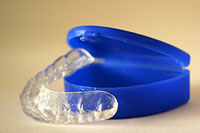You've worked hard for your beautiful smile; keep it that way!
Finally, your braces have been removed and your smile is beautiful, straight, and best of all, metal-free! However, your orthodontic journey isn't quite completed. To keep your smile looking its best, you'll have to wear a retainer to preserve and stabilize your results. Retainers are needed to control or limit potential changes in tooth position. They are used after braces treatment to hold teeth in their correct alignment while the surrounding gums, bone, and muscle adjust to the new positioning of your teeth.
Types of Retainers
Retainers are custom-made and can be removable or fixed.
- Aligner-style retainers, or Essix retainers, look similar to clear aligners and offer a more aesthetic alternative to wire retainers. This clear retainer may fit over the entire arch of your teeth, or only from canine to canine (clip-on retainer). It is produced from a mold of your newly aligned teeth
- Traditional removable retainers typically include a metal wire that surrounds the front teeth and is attached to an acrylic arch that sits in the roof of the mouth. The metal wires can be adjusted to finish treatment and continue minor movement of the front teeth as needed.
- Fixed retainers consist of wires bonded behind the bottom and/or top teeth.
Pros and Cons
- Removable retainers can be taken out for eating and hygiene routines.
- Removable retainers can get lost easily, so remember to keep yours in the case whenever you remove it to eat or brush.
- A fixed retainer is great if you don't want to keep track of it, or if you don't want to worry about how many hours per day it must be worn.
- Teeth with fixed retainers require a little extra attention to remove tartar while flossing. Patients with fixed retainers often must use floss threaders to pass dental floss through the small spaces between the retainer and the teeth.
Retainer Instructions

- Wear your retainer at all times, until the doctor instructs otherwise.
- Take your retainer out when eating, and always put it back in its case! (Most appliances are lost in school lunchrooms or restaurants.)
- Clean the retainer thoroughly once a day with a mild dish soap.
- When your retainer is not in your mouth, it should ALWAYS be in its case. Pets love to chew on them!
- Initially, you may find it difficult to speak. Practice speaking, reading, or singing out loud to get used to it faster.
- Retainers are breakable, so treat yours with care. If your retainer gets lost or broken, call us immediately.
- If you have any questions or concerns about your retainer, or you believe it needs adjusting, call us. Do not try to adjust it yourself.
- Always bring your retainer to your appointments.
- Retainer replacements are expensive, but with proper care they will last for years!
- Remove your retainer when you go swimming.
- Keep retainers away from hot water, hot car dashboards, pockets, the washing machine, and napkins.


 Website Powered by Sesame 24-7™
Website Powered by Sesame 24-7™